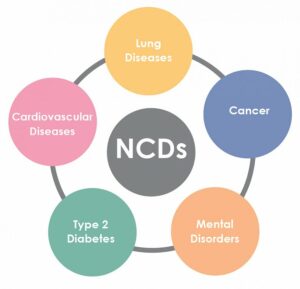Governments urged to prioritise investment in NCDs control and prevention
 The Ghana NCD Alliance (GhNCDA) has joined the world to observe the 2022 Global Week for Action on non-communicable diseases (NCDs) with call on governments to prioritise investment in the control and prevention of those diseases.
The Ghana NCD Alliance (GhNCDA) has joined the world to observe the 2022 Global Week for Action on non-communicable diseases (NCDs) with call on governments to prioritise investment in the control and prevention of those diseases.
This would help address the leading five NCDs; cancer, diabetes, chronic respiratory conditions, cardiovascular diseases, and mental health, and save 39 million lives by 2030 in low-and middle-income countries.
Treatment of the diseases are estimated to cost more than two trillion US dollars per year ($47 trillion from 2010 to 2030).
Mr Labram Musah, the National Coordinator of GhNCDA, made the call at a meeting jointly organised by the Alliance and the National Development Planning Commission (NDPC) as part of activities to mark the Global Week for NCDs campaign in Ghana.
A statement issued by the NCD Alliance said it would co-host this year’s virtual event with the World Health Organisation (WHO), and the World Diabetes Foundation on Thursday, September 8.
It is on the theme: “Invest to Protect NCD Financing as the Foundation for Healthy Societies and Economies,” and would focus on what it entails to invest in their control.
Dr Tedros Ghebreyesus, the WHO Director-General, and Mr Michael Bloomberg, WHO Global Ambassador for Non-communicable Disease and Injuries, would give the opening remarks, the statement said.
The campaign brings together civil society organisations and individuals around the world to call on governments to significantly increase funding for NCDs.
Mr Musah commended the NDPC for prioritising NCDs in its 2022-2025 National Medium-Term Development Policy to provide opportunity for Ghana to showcase its commitments to the control and prevention of the diseases and to attract greater support for interventions.
He entreated the NDPC to monitor the implementation of NCDs policies in Ghana; help to raise taxes on unhealthy products such as tobacco, alcohol, and sugar-sweetened beverages.
Mr Musah, also the Executive Director of Programmes of the Vision for Alternative Development, called for reinvestment of revenue generated from the National Health Insurance Scheme to finance health while including NCD medication in the Scheme.
He said there was the need for the meaningful involvement of people living with NCDs in all development matters and also involve or include relevant private sector in the effort of reducing the disease burden in the country.
Mrs Mary Mpereh, the Acting Director, Policy Development and Planning, NDPC gave the assurance that the revised policy on non-communicable diseases in the Commission’s 2022-2025 policy framework would be keenly implemented to reduce the disease burden in the country.
“We did not see much in terms of the last implementation of the NCDs policy and therefore we are very keen that this revised one is actually implemented to our satisfaction.”
She said there was the need for NCDs stakeholders to agree on the indicators they wanted to track in the policy framework for discussion in other for a.
On the issues of research, taxation, and international financing, Mrs Mpereh said the discussions were ongoing for the formulation of an Act to take care of same.
At the meeting were representatives from other civil society organisations, health institutions, and a four-member delegation from the Centre for Trade, Policy and Development, a think-tank in Zambia, who were on study visit to Ghana.
Source: GNA
